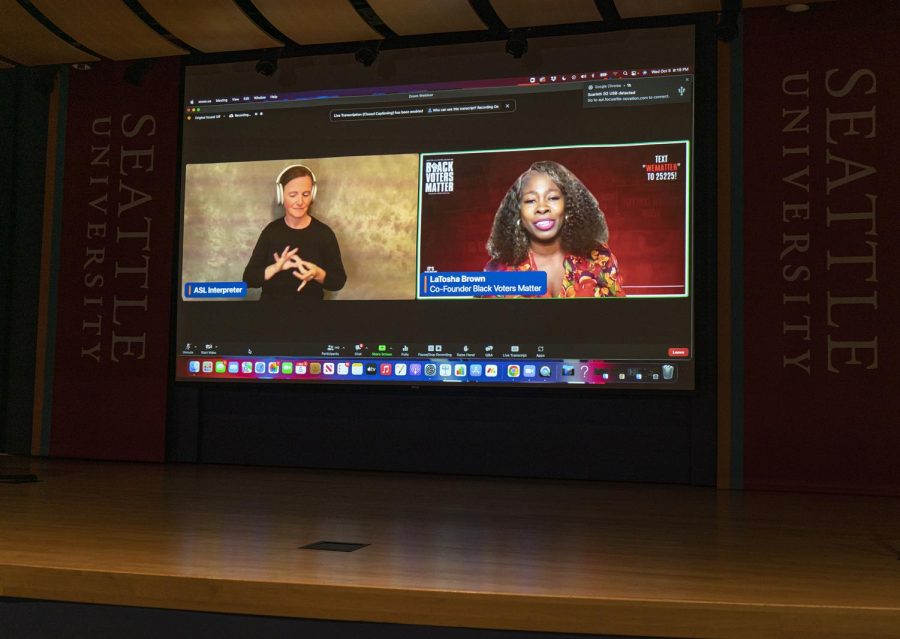LaTosha Brown Speaks on Opposition and Oppression
Latasha Brown speaks to a crowd virtually as a part of United Way of King County’s Advancing Racial Equity Series.
In a time of political unrest marked by protests and polarization, utilizing the right to vote has never been more critical. It is easy to become disillusioned with politics when elected leaders make bold claims promising a better world, but never seem to follow through. It is easier, still, to rationalize not voting because your vote is insignificant and your voice doesn’t matter. However, now more than ever, exercising your right to vote is crucial.
This is one of the various platforms championed by LaTosha Brown, a renowned speaker, author, activist and singer. Brown is the co-founder of the Black Voters Matter Fund and the Black Voters Matter Capacity Building Institute. Brown’s work with Black Voters Matter centers around boosting voting registration and political power in marginalized Black communities. She is also the founder of the Southern Black Girls and Women’s Consortium, a community of Black women working in philanthropy and activism.
Brown spoke virtually at the latest installment of the United Way of King County’s Advancing Racial Equity Series. Seattle University’s President Eduardo Peñalver opened the event, introducing Brown and her work.
Brown is a storyteller who uses singing and songwriting to transform culture. She opened her talk by singing a civil rights era liberation song. She then asked the audience to close their eyes and posed a question for reflection: “What would America look like without racism?”
To help answer the question, Brown drew heavily on her own experiences as a Black woman. Since she was a child in Selma, Ala., she has always been curious about who has power and how they choose to wield it. Do they use it for good, or do they use it to abuse and oppress? This question, in the context of politics, sparked Brown’s interest in Black voter registration and turnout. After running for public office, she came within a couple hundred votes of the incumbent, a white male candidate. Minutes after the vote had been decided in his favor, 800 more ballots were found by a local police officer. Brown felt a glimmer of hope. Those 800 votes could have closed the gap and secured her spot in local politics. However, since the election results had already been certified, the forgotten ballots were disregarded. This experience was one of Brown’s first personal experiences with the political landscape and the steps that are taken to keep Black women from sitting at the negotiating table.
The resistance she felt that day has become a theme throughout her career. In her talk, she outlined seven ways in which opposition can be reframed as opportunity. First, opposition gives us the ability to examine our position. She believes that opposition allows us to examine our current democracy and its inclusivity, or lack thereof. Second, in the face of opposition, we can either retreat or recommit and reimagine. Brown is a proponent of the second option, asserting that America must be radically reimagined as a democracy that lends itself to pluralism and is inherently inclusive. Third, opposition makes you sharpen your saw and protect your greatest asset: yourself. Fourth, opposition presents the opportunity to give ourselves grace and space. Fifth, opposition forces clarity by asking questions such as what kind of democracy do we want and what would it look like? Sixth, opposition encourages coalition building such as the uprising that occurred in the wake of George Floyd’s murder. Finally, opposition can be countered with the V-strategy: vision, voice, victory and vote. When people use their voices to vote in support of a clear vision, victory can be achieved. However, when people, especially young people and those with marginalized identities, choose not to exercise their right to vote, the vision so many share of a better democracy can never become a reality.
Brown closed the event by singing “This Little Light of Mine,” another anthem of the civil rights era and a reminder that Black communities will not be silenced. Black Voters Matter has donated 27 million dollars to grassroots organizations in the south and midwest. They offer technical assistance and strategy as well as provide spaces for Black organizations to gather. Brown has no plans of stopping her activism any time soon. Looking forward, Brown’s goal with the Southern Black Girls and Women’s Consortium is to raise 100 million dollars for women and girls in the next ten years and continue working towards abolishing barriers for Black voters.
Brown’s work just goes to show what numbers and passion can do. There are millions of Americans working toward a more inclusive democracy, but it still isn’t enough because there are others standing in opposition. It is up to every one of us to imagine a country without racism and use our voices to elect leaders who will take steps to create a better future.






